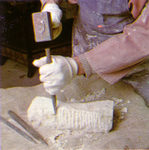 I spent the day writing yesterday…but I am being generous. I only got a few pages done and it was like chiseling at stone. Today I looked at the crap I wrote yesterday and was convinced that I’ve lost whatever minimal talent I had. My days as a writer are over. Then I read an excerpt of Walter Mosley’s book THIS YEAR YOU WRITE YOUR NOVEL in Oprah magazine…and felt much better.
I spent the day writing yesterday…but I am being generous. I only got a few pages done and it was like chiseling at stone. Today I looked at the crap I wrote yesterday and was convinced that I’ve lost whatever minimal talent I had. My days as a writer are over. Then I read an excerpt of Walter Mosley’s book THIS YEAR YOU WRITE YOUR NOVEL in Oprah magazine…and felt much better.
If you skip a day or more between your writing sessions, your mind will drift […] You will find that you’ll have to slog back to a place that would have been easily attained if only you wrote every day.
He’s right, and of course I already knew this, but I’m a writer, so I am naturally insecure. The fact is, I didn’t write for two days because I was bogged down with catching up on my life (after four months away from home) and with FAST TRACK stuff. So when I finally sat down with the book again, I was starting from a dead stop. It should go a bit better today…then even better tomorrow.

Lee: I never thought I’d say this but, you’re right. Momentum is the key. Two tricks I use are (1) always finish the chapter at hand, never stop midstream; and (2) jot down a couple of “next” sentences when the chapter is done, to remember where the next chapter is headed. But the best thing to do, by far, is write every day while the title is in progress.
Lee, know that feeling. It took me six weeks after wrist surgery, to do anything but one-finger edit what I’d written. Had to do a lot of editing on the crap that came out the first few days, but fell back in line before the week was over.
I think taking two days off to catch up after being away from home for 4 months is perfectly reasonable — I’d probably need more time than that — but I sort of know what you mean. It’s better to establish daily habits. I often work on weekends for just that reason.
By the way, not only are you a wonderful writer, but you bring good luck! My local library is having a summer reading challenge for adults — isn’t that fun? We’re supposed to read “mysteries set in big cities,” and submit the titles for a chance to win prizes. The card I filled out for “Mr. Monk and the Two Assistants” turned out to be this week’s winner, so I won a gift certificate to See’s. Hooray!
I’m with Jim — I always look to self-published authors for my writing advice. What does a hack like Mosley know? He’s a sell-out, conglomerate writer.
The most important piece of writing advice I ever received is one I’ll never forget: always remember to sign the check you send in with your manuscript. If you do that, your work will never be rejected.
Ernest Hemingway always quit in the middle of a scene; that way he knew where he would be going the next day, and didn’t face the anguish of starting up a chapter. But we all have our own ways of reconnecting with our stories and there is no one method that fits all. Mine is to give myself permission to write junk, if need be. Sometimes it is; more often, it leads me to where I’m going, like pumping muddy water out of a well to get to the clear.
So true. Mosley also said write one and a half to three hours a day. I found my writing was much improved when I stopped after three hours, instead of writing all day and hating my life.
I recently commented to someone that my goal right now, as I assume what will become a fairly challenging day job, is to continue writing, even if it’s at 5 miles per hour. You force me to put my goal up front on my blog, so… thanks.
Dear Afraid to Sign Your Name:
With respect your comment, “I’m with Jim — I always look to self-published authors for my writing advice.”
Thank you for referring to me as “self published.” I know you intended it to be an insult, but what it means is that I can not only write a competitive MS, but can also do everything else associated with publication, and produce an end product that is both in the marketplace and competitive. So when “self published” means “self made,” I’m proud to be called either.
As to your comment, “The most important piece of writing advice I ever received is one I’ll never forget: always remember to sign the check you send in with your manuscript. If you do that, your work will never be rejected.”
Here’s some more advie: Anyone who writes something worthwhile should sign their name at the end and be proud of it. If it’s no good, of course, or destructive, or embarrassing, you may not want to sign your name. Wait, what am I telling you this for, you apparently already know it. Cheers, Jim.